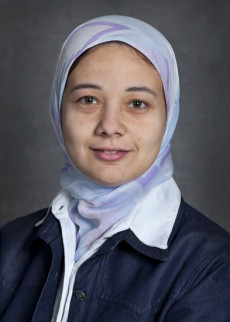Taghrid Samak Works to Affect Social Development in Egypt
March 29, 2013
Jon Bashor, Jbashor@lbl.gov, +1 510 486 5849

CRD's Taghrid Samak chaired the 2013 EgyptNEGMA conference to choose winning proposals for advancing social development in Egypt.
Since the Egyptian uprising that ultimately toppled the 30-year reign of Hosni Mubarak began on Jan. 25, 2011, Taghrid Samak of Berkeley Lab’s Computational Research Division has watched as the initial hope for her homeland has unraveled into a “messy” situation, as she puts it.
But on March 23 and 24, Samak was at MIT, meeting with other Egyptian professionals to take concrete steps to address at least some of the pressing issues in the country that launched the Arab Spring. She chaired the 2013 EgyptNEGMA (Networking, Entrepreneurship, Growth, Mobilization, and Action) conference to review 10 finalist proposals for advancing social development in Egypt and choosing the top three. The organizers of the top projects will go on an incubation trip to further network and receive more in-depth feedback through working groups based around their specific proposals.
The finalists in the Impact Egypt! Competition were selected from 58 proposals outlining programs to create jobs, help Egyptians solve local problems, improve education, increase opportunities for the disabled, and help local organizations get more resources. The theme of this year’s conference is “Empower the Crowd,” which Samak said is an apt description of the social revolution in Egypt. The goal is to connect people working “on the ground” in Egypt to experts in the U.S. who can provide expertise and other resources.
EgyptNEGMA was formed as a nonprofit organization in 2011 by Egyptian Americans in the MIT and Harvard community and held its first conference last year. “That conference was such an amazing experience that I volunteered to help this year and am chairing this year’s conference,” Samak said.
Before the conference, a workshop was held to help the finalists polish their presentations. Speakers and panelists at the conference talked about how to advance social development in Egypt, as well as which approaches have not been successful. There were seminars on building skills, measuring the impact of programs, and marketing and branding. After the conference, participants voted to select the three projects for further development.
“It’s amazing to see all these people coming together for a great cause and doing something positive for Egypt,” Samak said. “If we don’t do anything, nothing will happen. If we are able to help them, I think others will join in and things will get better.”
And it’s important for the projects to have strong ties to non-government organizations in Egypt, she said. “They trust their own, and it also gives them hope that they are getting support from Egyptians who are outside the country,” she said. “The most important thing we can give them is support. There are many ways to transfer our experience, and we are trying to find the best way to do it.”
Education and networking are central to Samak’s experience. Her father was a math teacher in her native Alexandria, and her mother taught biology. After earning her bachelor’s degree in computer science at Alexandria University, Samak came to the United States to pursue a doctorate in computer science at DePaul University in Chicago, where she worked as a teaching assistant, research assistant, and then lecturer.
While attending the annual Grace Hopper Celebration of Women in Computing conference, she met Deb Agarwal, head of Berkeley Lab’s Advanced Computing for Science Department, as well as recruiter Jeff Todd. After finishing her Ph.D., she joined the lab as a postdoc and is now a research scientist. Her current research areas include data mining for genome assembly quality assessment, modeling of energy consumption measurements for large-scale computing systems and “fingerprinting” HPC codes for cybersecurity analysis. Samak is also supporting DOE’s Carbon Capture Simulation Initiative by applying machine learning to build data-driven dynamic reduced order models for power plants to help reduce carbon dioxide emissions.
Samak maintains ties to Egypt and the Middle East through other outreach projects. For example, each summer she mentors students of her former professors in Alexandria, conducting weekly sessions over Skype. She even helped one of those students attend the SC12 conference in Salt Lake City.
For the past two years, she has also participated in TechWomen, a U.S. Department of State initiative to bring women who are technical leaders from the Middle East and North Africa for a month of mentoring and exchange of ideas with Silicon Valley companies and visits to Berkeley Lab. Samak has volunteered as a cultural and professional mentor for some of the participants during their visit to the U.S.
“With every student I talk to, I explain to them how computing helps science and improves our lives,” Samak said. “That usually has a big impact on them.”
About Berkeley Lab
Founded in 1931 on the belief that the biggest scientific challenges are best addressed by teams, Lawrence Berkeley National Laboratory and its scientists have been recognized with 16 Nobel Prizes. Today, Berkeley Lab researchers develop sustainable energy and environmental solutions, create useful new materials, advance the frontiers of computing, and probe the mysteries of life, matter, and the universe. Scientists from around the world rely on the Lab’s facilities for their own discovery science. Berkeley Lab is a multiprogram national laboratory, managed by the University of California for the U.S. Department of Energy’s Office of Science.
DOE’s Office of Science is the single largest supporter of basic research in the physical sciences in the United States, and is working to address some of the most pressing challenges of our time. For more information, please visit energy.gov/science.









